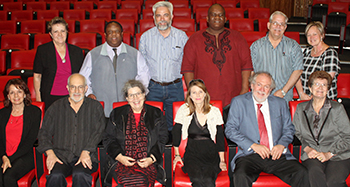Latest News Archive
Please select Category, Year, and then Month to display items
14 June 2024
|
Story Anthony Mthembu
|
Photo Suplied
 Jeremiah Hlahla, a UFS student completing his PhD in Botany at the University of Debrecen as part of an exchange initiative funded by the Erasmus+ Mobility Programme.
Jeremiah Hlahla, a UFS student completing his PhD in Botany at the University of Debrecen as part of an exchange initiative funded by the Erasmus+ Mobility Programme.
As part of an exchange initiative facilitated by the Erasmus+ Mobility Programme, Jeremiah Hlahla, a student at the University of the Free State (UFS), is nearing the completion of his PhD studies at the University of Debrecen in Hungary. Hlahla’s journey, which began in February 2024 and is set to conclude in July 2024, has been a remarkable learning opportunity. “As a first time-traveller to Europe, I have thoroughly enjoyed engaging with people from different countries and cultures,” he said.
The benefits of international collaboration
Hlahla is currently pursuing a PhD in Botany, focusing on plant stress physiology. “My current PhD project investigates the physiological, biochemical and morphological responses of vegetable-type soybean, or edamame, to combined drought and heat stress,’’ he explained. He considers the University of Debrecen the ideal institution to complete his research due to its extensive expertise and resources in similar projects. He noted that his colleagues at Debrecen conduct significant work on plant protection against biotic and abiotic stresses, including salt and drought stress, as well as proteins and amino acids in barley and other legumes.
Given the vast knowledge available on similar projects, Hlahla has found substantial engagement with his work at the University of Debrecen. “Upon arrival, I delivered an introductory lecture presenting my UFS project on the synergistic effects of combined drought and heat stress on the physiology and biochemistry of edamame. It was an engaging session as everyone could relate to my work and asked many questions,’’ he said.
Insights gained from the exchange
Hlahla has also gained valuable lessons that will assist him in his research career, including biotechnology and physiology tools. “I learned how to prepare samples and use high-performance liquid chromatography (HPLC) and reversed-phase ultra-high-performance liquid chromatography (UHPLC) to quantify proteins and amino acids,’’ he said. These techniques are beneficial not only for his current work but will also support future soybean research.
As his experience at the University of Debrecen nears its end, Hlahla reflects on the collaborations and friendships he has formed, which stand out as a significant highlight.
Special Edition of the Journal for New Generation Sciences launched at UFS
2016-10-26

Participants of the round-table discussion
at the launch of the Journal for New Generation
Sciences during the UFS Faculty of Education
colloquium which took place on 20 October 2016.
Photo: Oteng Mpete
The Journal for New Generation Sciences Special Edition was launched on 20 October 2016, at the Albert Wessels Auditorium, during the University of the Free State’s (UFS) Faculty of Education colloquium on the field of technological higher education and its contribution to the knowledge society.
Partnerships and knowledge production
Prof Laetus Lategan, Dean of Research and Innovation at the Central University of Technology (CUT), led the launch. “Higher education is not only about producing knowledge but it is also about fostering new relationships,” said Prof Lategan referring to CUT’s collaboration with the UFS Faculty of Education.
“Empowering people is important for capacity building, offering novice writers the opportunity to learn and a way to enhance their academic writing,” said Prof Lategan.
The Journal for New Generation Sciences is an accredited research publication in which scholars, internal and external to the institution, may publish. It accommodates national and international publications and showcases the university’s commitment to applied research.
Growing in leaps and bounds
According to Dr Somarie Holtzhausen, from the Faculty of Education’s School of Higher Education Studies, all papers are peer-reviewed by at least two experts. An editorial review also secures the quality of the paper. In 2014, when the journal was established, 30 contributions were submitted, although only 25 were successfully published.
“We turn down content not because it is not good, but unfortunately because it does not speak to the heart of the journal,” said Prof Lategan. With 60 peer reviewers, the journal’s contributors are assured that at least two peer reviewers will assess their article.
The Journal for New Generation Sciences supports both high-quality scholarly work of established researchers, and capacity building among new researchers.
During the round-table discussion various contributors to the journal spoke about their research and involvement in the publication of the journal.